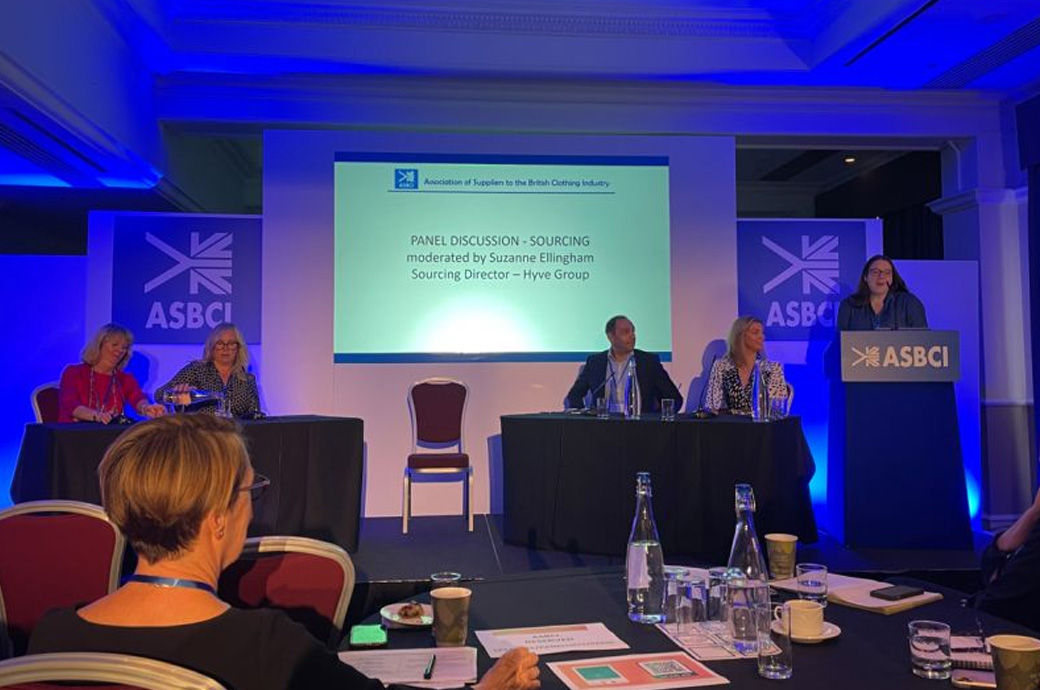Collaboration emerges as a theme at ASBCI Fashion Re:set Summit

TexPro, the market insight tool from Fibre2Fashion, was a supporting partner at the event. As a market research partner for the global textile and apparel sector, TexPro helps decision makers create data-driven strategy using the latest information about textile, apparel and nonwoven textile industries. Right from raw materials price to current trade data and from existing government policies to global tariff information, TexPro brings the most relevant data to fingertips.
The Fashion Re:set Summit was held around four key themes – ESG, sourcing, digital transformation, and staff wellbeing and talent management. There was a combination of presentations and panel discussions.
Ben Hanson, editor in chief of The Interline, opened the summit with a keynote presentation on the current state of the industry.
The first panel on ESG in the fashion industry was moderated by Suzanne Ellingham from fashion trade show organiser Hyve Group Plc. The panel featured Peter Hughes, head of sustainability business development at Eurofins; Anne Peirson-Smith, professor of fashion, School of Design, Northumbria University; Stella Claxton, lecturer and senior research fellow at Nottingham Trent University; and Helen Colebourn, technical consultant at Bureau Veritas Consumer Products Services.
The second panel saw an open and honest discussion on Sourcing. It featured Jennifer Holloway, CEO of Fashion-Enter Ltd; Kate Hills, founder of Make it British; Phil Oakley from Kornit Digital; and Angela Gaskell, group sourcing, sustainability and fit director, N Brown. The discussion was moderated by Suzanne Ellingham.
Jason Wang, chief operating officer, Alvanon, joined virtually for the session on digital transformation. Joining next virtually was Morgane Lopes, digital marketing director at French luxury retailer Printemps, who talked about the launch of their first metaverse store.
The final panel was moderated by Ton Wiedenhoff from Alvanon. It featured Sue Mardon form Alison Hayes; Michael Lock, VP of software sales at Lectra; Nigel Read from DeSL; Richard Jessup from gold sponsor Optitex; and Stephen Taylor from IBM who discussed the impact of consumer behaviours and how they have changed in recent times.
The Fireside Chat saw Jennifer Holloway and Kate Hills discussing the skills shortage in UK garment manufacturing.
Key takeaways
- Collaboration is essential if the industry is to adapt to current and future challenges. Collaboration must be up and down the supply chain and peer-to-peer, and it must be fair and equal, with all voices are heard. Too often suppliers and manufacturers are not represented when the industry comes together, but transformation can’t be achieved without them. It is also essential that big brands don’t railroad smaller ones and that there is a sharing of learning between competitors.
- Commitment to change must come from the top. Without senior-level buy-in and strategic implementation, initiatives will not succeed. This is particularly true for digital transformation, which can require significant investment. Without top-level support and an integrated transformation programme, efforts may be hindered by a lack of alignment on targets and a failure to understand the changes required to operating models and capabilities.
- Digital technologies are an essential component in the delivery of the change the industry requires. From sustainability initiatives such as supply chain traceability or reducing materials use to delivering greater business resilience through better planning or intelligent market management and channel allocation, to the adoption of new business models, for the most part the technology already exists to support this.
- To reset and effectively manage the challenges facing the industry, we need employees who are skilled, knowledgeable, and supported in creating the transformative solutions that will deliver beneficial outcomes for their organisation and the industry. Creating a positive environment by promoting employee wellbeing is key to building a productive workforce that can focus on achieving higher organisational performance and address current and future sustainability goals.
Click here to read the full event report of ASBCI Fashion Re:set Summit.
Fibre2Fashion News Desk (RKS)
































-Ltd..jpg?tr=w-120,h-60,c-at_max,cm-pad_resize,bg-ffffff)





.jpg?tr=w-120,h-60,c-at_max,cm-pad_resize,bg-ffffff)
.jpg?tr=w-120,h-60,c-at_max,cm-pad_resize,bg-ffffff)






